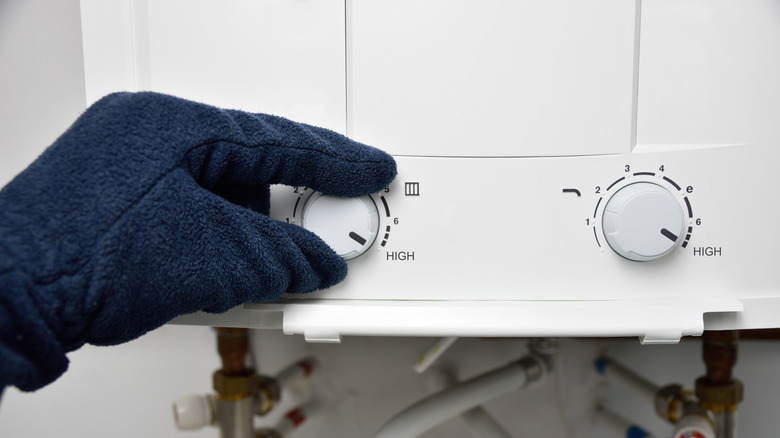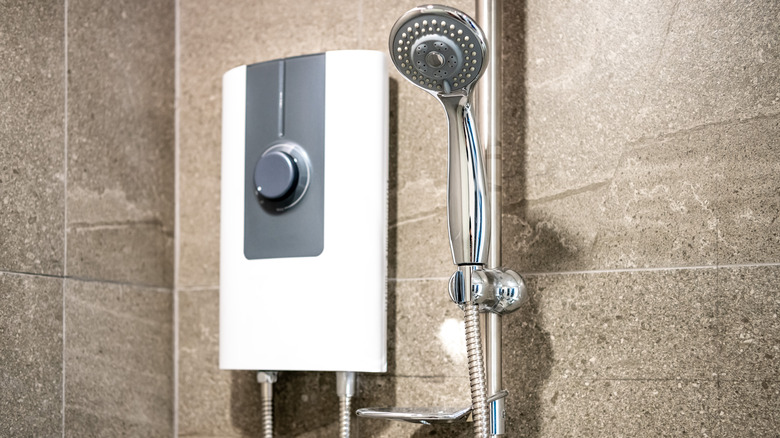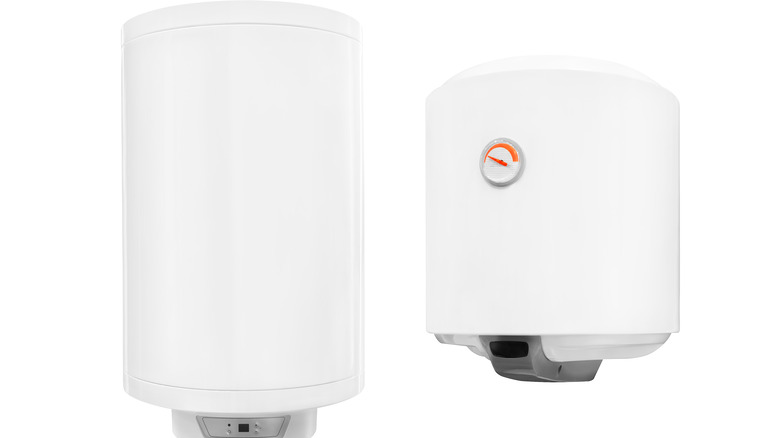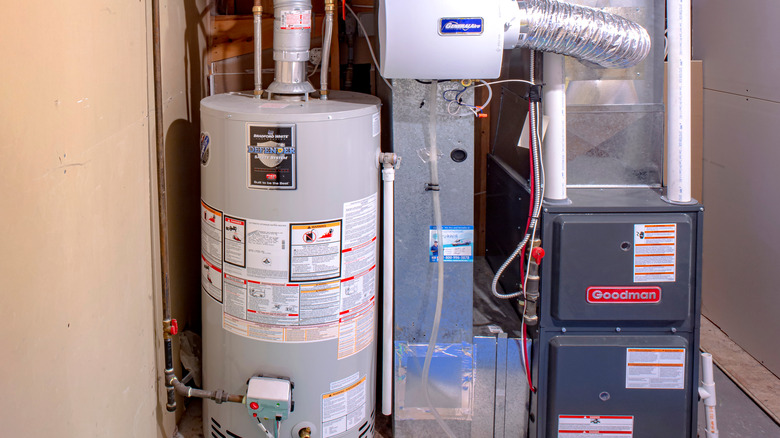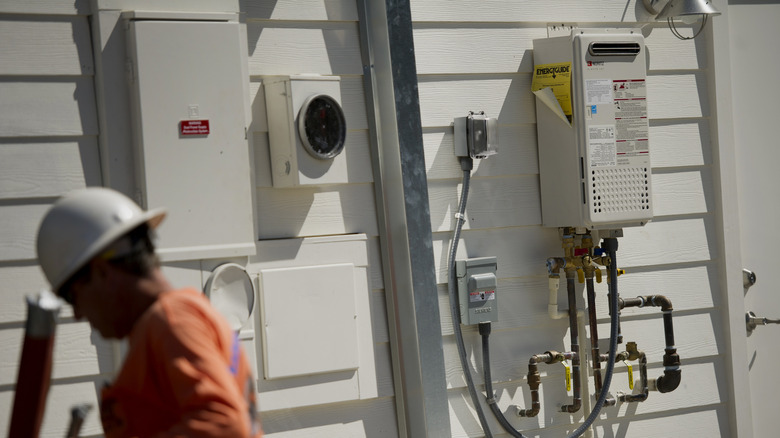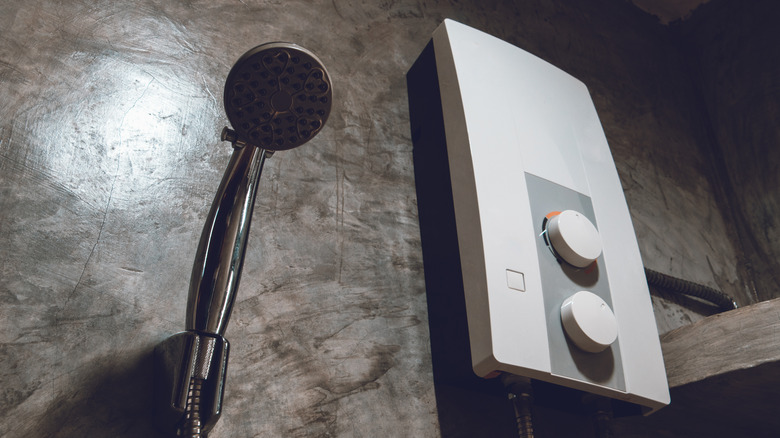Tankless Water Heaters: What To Know Before You Buy
There are few things more unpleasant than enjoying a hot shower only to have that steamy water suddenly turn cold. If you're mentally shouting "AHH" just reading about the experience, than this handy home appliance may be the perfect solution for you: A tankless water heater is a water heating appliance that provides continual hot water and eliminates that "hot water ran out" problem.
Unlike traditional tank-based water heaters, there is no hot water tank to drain, so there's no lag between heating, reheating, and dispensing of that steaming H20. In addition, many people enjoy tankless water heaters for their energy efficiency. In an average home that uses 41 gallons of water or less per day, the Energy.gov reports that a tankless water heater can conserve from 24% up to 34% more energy than its tanked counterpart. Ideal for long showers and running multiple appliances at once, the efficiency of these appliances may vary based on use, household size, and the specific device. Installation costs may be a factor, but these heaters are generally praised for their long lifespan, generally making tankless water heaters a sound investment.
Cost savings and hot showers are major advantages of this appliance, but there is some more information you should know before making a purchase.
What is a tankless water heater?
Traditionally, water in your home has been stored in a large tank and is heated and ready-to-go. Sometimes referred to as a tank-based water heater, these units are well insulated to keep the water hot while it is waiting, but can take a significant amount of time to warm things back up if they are emptied. A tankless water heater works like an on-demand water heater to heat and send water only when it is needed.
The process as described by Rinnai is as follows: A flame ignites two different heat exchangers. Water gets preheated at the first heat exchanger and then really warms up at the second one. This hot water then travels to the faucet desired. The flame will increase or decrease as the water remains on to provide an ongoing and continual flow of hot water for as long as the plumbing is in use. When not in use, only the small amount of preheated water remains warm, waiting to repeat the cycle. As water is heated as-needed, there is no possibility of this water running out. Some water heaters may work in a slightly different manner, but the general idea of consistent hot water is the key.
Types of tankless water heaters
Water heaters may be connected to electricity or gas, but this decision will likely have been made for your home prior to the purchase of any appliance. Instead, you'll be choosing whether you want a non-condensing, condensing, or non-condensing hybrid, according to Fast Water Heating Co. Non-condensing units can be considered first-generation tankless heaters that are "tried and true" but less efficient. The non-condensing style uses a single heat converter and has an Efficiency Factor (EF) of .82 to .85. Condensing tankless water heaters are the next generation, using two different heat exchangers to maximize heat output with and EF of .92 to .94. The condensing units are easily ventable, but lose efficiency on short water draws.
The hybrid model water heater is most energy efficient with an EF rating of .92 to .96, usually operating at 94% efficiency. These hybrid models have a 1 to 2 gallon holding tank for smaller water draws and utilize the same process as a condensing heater for larger water needs for maximum efficiency. HomeServe also notes that tankless water heaters can be sold or converted into "smart water heaters," using different applications of modern technology from AI to Bluetooth and digital displays. In s nutshell, the best type of tankless water heater may depend on your home, location, and budget.
Choosing the right size tankless water heater
Different households need different water heaters; just like people, there is no true one-size-fits-all. Tankless water heaters are available in a large arrays of shapes, sizes, and features just like any other modern appliance. Judging the size of tankless water heater you need is a little bit like selecting the right bandwidth for WIFI — you'll need to decide how many things you need to run at the same time. Water Heater Hub provides the example of wanting to run the shower, washer, and kitchen sink at the same time; to do so, you'll need a unit capable of handling 6 gallons per minute of flow.
Buyers also need to be aware of how much local water will need to be heated. In extreme climates, you'll need to heat from a very cold temperatures close to freezing, whereas warmer areas can begin heating at more temperate conditions requiring less energy output. For example, while your bathtub need only heat water to 102 degrees, your kitchen sink typically uses water as hot as 110 degrees. Heating to these temperatures is far different if your groundwater is 36 degrees than if the exterior pipes are sitting at a warmer 55 degrees.
Benefits of a tankless water heater
A tankless water heater is able to regulate the flow of hot water to different parts of your home and adjust the gallons per minute of hot water available based on information gauged by sophisticated sensors, according to Home Depot. For the consumer, this means there's a continuous flow of hot water (no waiting for more), and that water will come out of your faucets at the ideal temperature (no scalding). Many owners appreciate the advanced digital displays and controls available on many models as well as self-diagnostic features.
Plenty of tankless water heater models are space-saving and energy-saving, too. Additionally, choosing an Energy Star model water heater can contribute to savings in the form of lowered household energy bills by up tp 40%. The average tankless water heater is also long-lasting and able to work for an average of 20 years, which makes these popular for both new builds and retrofits or remodels. Some people also like tankless heaters for locations distant from the primary home water heater like a hot tub or a remote bathroom. Compared to a traditional water heater, the longer life, lower running costs, and smart management systems of tankless water heaters are a benefit.
Disadvantages of a tankless water heater
One of the primary disadvantages of a tankless water heater is that efficiency drops in homes with greater use. For households with increased water use around 86 gallons, tankless heaters drop to 8% to 14% compared to traditional water heaters, per Energy.gov — still a savings but not nearly as great as the 30% or more in smaller homes. Tankless water heaters also tend to cost more upfront due to both installation and appliance purchase. And while they generally last for 20 years, that isn't significantly higher than the potential 15-year lifespan of tanked heaters for some shoppers.
Additionally, pilot lights in gas-based heaters may also cost extra due to energy waste for households that don't tend to use large amounts of hot water. While gas typically provides greater heat flow during use, maintaining the pilot can sometimes reduce those cost savings. Furthermore, survivalists and other emergency preppers have some inventive hacks that will only work with a traditional water heater (via Ask a Prepper), so if emergency preparedness is your thing, the tankless option may be a poor selection. Like any appliance choice, tankless water heaters have advantages and disadvantages based on your unique home needs.
Tank-based vs. tankless water heaters
Some of the differences between tankless water heaters and storage tank style water heaters is based on timing, as noted by Consumer Reports. Water heaters are often bought in emergencies when buyers have little time to research. In addition, tankless water heaters have been growing in market share, but in past years it could be difficult to find a plumber who fully understood this newer technology.
As to which one is better? Consumer Reports tested for use on the higher end near 84 gallons of water per day, which ranks up there with the amount that is reported by Energy.gov to reduce tankless efficiency. At this rate, both electric tankless and electric tanked heaters were effective at the job of heating water, but some tankless electric models began to lag with colder groundwater temperatures compared to their conventional counterparts. Gas models of both types tended to cost less to run overall, but engineer John Banta notes, "Electric models actually run more efficiently ... but the higher cost of electricity makes them more costly to operate."
Overall, the cost of switching from one water heater to another may be the final detail buyers need to help choose. That's because the switch from tanked to tankless seems to have a larger effect on the overall price than running each unit, no matter which type was chosen.
Lifespan of a tankless water heater
Tankless water heaters are usually long-lasting; Home Inspection Insider states that a properly maintained tankless water heater will last for 20 years or longer. Proper maintenance is clearly key, however, as manufacturer's warranties tend to finish off around 10 years. This maintenance generally includes regularly scheduled descaling, which is a fancier way of saying you'll need to remove the calcium buildup in your system. This process takes about 90 minutes and you can reportedly buy a kit off Amazon to simplify the process. The tools required are simple and include many items you likely use in cleaning already: 4 gallons of white or cleaning vinegar, two drain hoses, a 5 gallon bucket, and a descaling pump.
Frequency of maintenance depends on the amount of minerals in your water. Even without fancy testing equipment, you can tell your home has hard water by noticing traces of minerals after evaporation, spots on glassware, or sometimes you'll feel a film on your hands after washing, according to Healthline. The location of your tankless unit also affects lifespan as outdoor units are more prone to corrosion, although they're less likely to rust than any of their tanked counterparts overall. Finally, if properly installed a tankless unit will last 5 to 10 years longer than it's tanked counterpart, making these units a very future-forward purchase.
Cost of a tankless water heater
Per Home Depot, expect the cost of your tankless water heater to be $1,200 to $5,000 including installation, with an average total cost of about $3,500. This is admittedly a higher up-front cost compared to a tank-based water heater that ranges from $1,300 to $2,000 with an average cost of $1,500. These total costs are based on the price of the water heater itself, permits, labor of installation, and disposal of your old water heating unit.
Installation costs can also be highly dependent on region, not just on the cost to heat the water. For example, in the Pacific Northwest it costs 5% to 15% more than the national average to install a tank-based water heater, but 15% to 25% less than the national average to install a tankless. Alternatively, in the Southwest it costs 1% to 10% less than the national average for a tank, but 1% to 10% more than the national average for a tankless.
If the new water heater is especially smart with technology, there may be added features which can further increase this cost. On the opposite side, if your plumbing is very old, installation may required bringing other areas of the house up to code, which can also significantly change the total amount you spend. Gas water heating units are generally less expensive than electricity-based units to run, but may also affect your upfront installation costs.
Top brands of tankless water heaters
John Banta was the engineer who oversaw Consumer Reports' testing water heaters at high capacity. At 84 gallons per day he observed, "Whole-house tankless heaters are designed to produce a target amount of hot water — 3 to 4 gallons a minute — and they did. ... We didn't find meaningful performance differences that would cause a consumer to choose one brand over another."
Forbes experts also reviewed top tankless models, finding little difference in overall performance for the high-level contenders. Of the models reviewed the top choice was the EcoSmart ECO 27 with a rating of 4.2. Also rating 4.2 out of 5 were the Rheem's 18kW and the Stiebel Eltron, followed by the Rheem 13kw, the Eemax 27kW, the Rinnai RU160iN RU, and the Titan N-120 at a rating of 4.1. The top-reviewed tankless heaters are all in close contention, and the exact best choice will likely depend upon your individual home needs. Don't forget to check performance against your own needs for water capacity, groundwater temperature, and the pipe and power infrastructure of your home. Finally, choosing a top-rated brand name will likely give you the best return on investment, but it's worth checking pricing and reviews for lesser-known models that may still meet your household needs.
